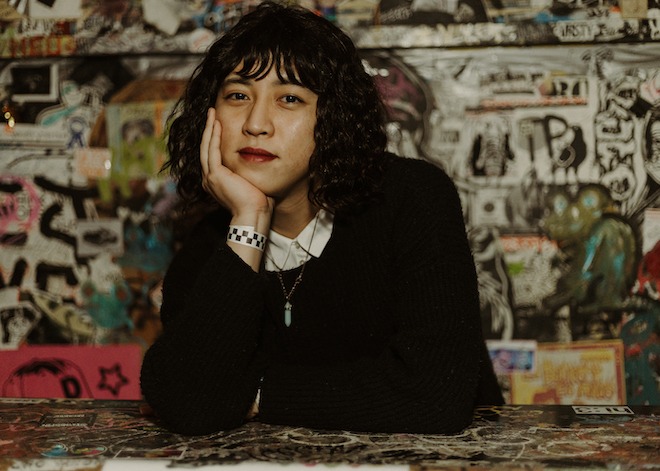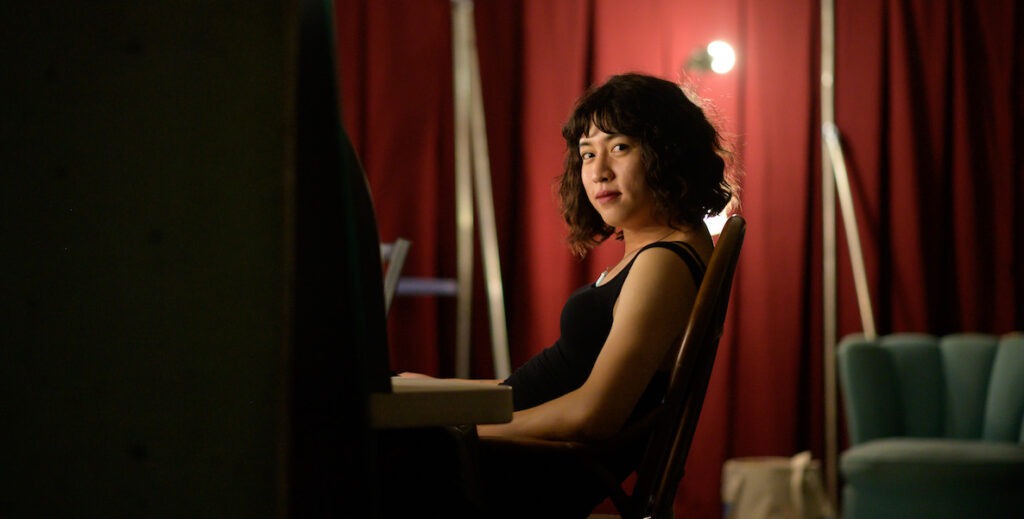Tan Hoang moved to Philadelphia for love, comedy and cheaper rent. The stand-up comedian was hustling in New York City when she met fellow stand-up Joe Bell during an open mic in Philadelphia. The two went on to date, and six years later are the co-hosts of Tattooed Momedy, a fresh and free-to-attend monthly comedy showcase held at Tattooed Moms for nearly a decade. Hoang feels at home in Philly’s intimate comedy scene, where she has shown off her chops while landing unique opportunities, from opening for Alok Vaid-Menon and Joel Kim Booster, to performing at a swingers’ convention in North Jersey.
Typically, stand-ups build success by doing the mainstream comedy club circuit — with all that entails. Hoang, however, has carved her own career path by focusing on craft over connections. “I don’t want to hang around those people or spend money at the bar every night,” she says.

Nonetheless, Hoang does not consider herself to be an “alternative” comic. “If you’re not onstage being really crass and really pushing the buttons on what you can say,” she says, “then you’re seen as alt.” Instead, she takes inspiration from a wide range of comics, including locals Rose Luardo, a surrealist comedic performer, and Michelle Biloon, a well-traveled stand-up veteran. “That’s where I aspire to be,” Hoang says.
It can be difficult to measure success when taking the road least traveled. “There was a time there where I was definitely very annoyed and felt like an overlooked person,” Hoang says, “but then, I one day just realized I’m doing really cool shows. I’m traveling a lot. I’m constantly doing shows outside the city, and people remember me from those shows and the ball just keeps rolling.”
As part of a partnership with Forman Arts Initiative, The Citizen caught up with Hoang. The interview has been condensed and edited for clarity.
How did you get into stand-up comedy?
I went to acting school in New York City around 2013. It was New York Conservatory for Dramatic Arts and I did a two-year program. I went in as a straight male. They say the easiest thing to cast is a straight, White male. After my first year, I came out and started transitioning. And by the time I graduated, I’ve now transitioned, and now I’m one of the hardest things to cast.
Luckily, my acting school had stand-up an elective. I realized, Hey, this doesn’t have any casting involved. You just got to come up with your own material and sell it. I found that so freeing. As soon as school ended, everybody else was going around auditioning, and so did I, but I was also hitting up open mics and trying to build my comedy set. I took a break during the pandemic and didn’t do any comedy for two years.
I definitely felt like I grew as a comedian by taking that break because you can start to look at your own comedy from far away and you’re not so attached to it. It helps you rewrite stuff and makes it better. I’m still doing old jokes from before the pandemic. I just think they’re more exciting to me now because I’ve been tweaking it.
How do you prepare for your stand-up set?
I write everything down word-for-word. I approach it as an actor. As an actor, I just want to go up prepared. Even if it bombs, at least my delivery of my jokes will have confidence. Also, I don’t like to do too many new jokes in a set. I sneak about two to three in, and if the show continues to go smoothly, then I know they went well.
If the show’s going well, and I insert a new joke, and it doesn’t work, then I’m like, alright, that’s a very clear indication that that needs work. And then I go on with the show. When I sneak in a new joke, and it doesn’t work, it should seem seamless. I don’t want the audience to think, oh, that was a new joke and it didn’t work.
Again, my process all comes from an acting background. That is my style. I love to create scenes in my jokes. The joke writing itself is like 30 percent. Seventy percent is, all right, how am I going to communicate this? I’m always thinking about what action I’m doing. Is this a brag? Is this a complaint? I can find the right action to juxtapose it. Sometimes, I’m doing this joke about, “Oh, I’m having such a terrible day,” and it’s a complaint. But wouldn’t it be funny if I actually was seductive about it? Let me seduce you by talking about how bad my day is. And all of a sudden it’s weird. I always play around with that. The script is always the same, it’s just the action is completely different.
I used to write my set in my hand and it became a crutch. My boyfriend said, “Try not to do that,” and ever since I stopped writing jokes on my hand, I just choose what I’m going to say while I’m on stage. It’s so much nicer because I know all my material. Everything is memorized and practiced dozens and dozens of times. So rather than being like, this is what I’m going to do but what if they don’t want it?, I’ve been forcing myself to go on stage and decide in the moment what I think you guys would like next, and it works better. I’ll tell two jokes and then I’m like, okay, I think you guys are into the nasty stuff or I’m like, you guys are actually a nice, loving, cute crowd, so I don’t have to be so raunchy.
What’s an example of how a joke has changed over time?
I used to have this throwaway joke that’s like, “I’m from Vietnam and it’s legal to eat dogs in Vietnam, which I don’t know why anybody would do that because dog tastes just like cat.” Now, if I do that joke now, I say it angrily because I realize I need people to know immediately that I am against eating dogs. It changes the tone of the punchline a little bit.
But now, I realize that joke is actually not that funny itself. So, now, that joke has become a gag. Whenever there’s a photographer in the room I’ll be like, “Guys, there’s a photographer in the room. I need photos of me onstage and a good photo captures the essence of a joke.” Then I tell the same joke, and then pose [Hoang demonstrates by striking a cutesy pose]. To have it be part of a bit where I tell a terrible joke and then pose, that, to me, is the final evolution of this freaking 8-year-old joke.
Do you think there’s a particular style of comedy that’s distinctive to Philadelphia?
Not everyone vibes with Shane Gillis‘s comedy, but he is the hometown hero. It made everyone here go towards that, go towards his style. Personally, I find it pretty crass. It’s very edgy. I’m not a PC comedian either. I talk about all kinds of stuff, but there’s a difference between [what I say] and saying the R-word onstage. I don’t know what’s happening in the scene right now, but I’m seeing people say that a lot.
It’s just very regressive. It’s jokes I’ve heard before. Everyone is trying to be like “Oh, what? Did I offend you?” And you know what? Right now, there is an audience for that because I see it kill in the club, people being so crass, and aggressive, and mean. And it works in the club, and that’s just not me.
What is the origin story of Tattooed Momedy?
Tattooed Momedy was hosted for so long by a comedian and close friends of ours, Wolfgang Hanulak and Michael Kelly. Then the pandemic happened. When the bar wanted to bring it back, Wolfgang and Michael didn’t want to host it anymore. And they just handed it to us. I definitely feel like me and my boyfriend, Joe Bell, who I co-run it with, we definitely make it our own. The only thing that the owner told us is make sure this show is not like any other comedy show in Philadelphia. And we’re like, “Okay, so you want a show that doesn’t consist of five straight males and one token woman? We can do that.”
And we have been doing that, even if it means we book people outside of the scene and outside of Pennsylvania. Our shows are much more curated, in my opinion. We can’t just throw a bunch of good comedians together if their vibe doesn’t mix well.
There’s a difference between hosting a stand-up show and being a performer. Can you talk a little bit about that?
As the host, you have a very important job to do. The host shouldn’t be the first person that enters the stage and talks, there should be a voiceover, or someone just to be like “Give it up for our host!” Now, people are looking at the host. As the host, you have a very different job than the comedians because it is not your job to have a really good set and kill. Yes, you should make people laugh, but your job is to make the audience trust in the program they’re about to see.
The host keeps the audience in check because sometimes a comedian might not do so well. It’s [the host’s] job to bring it back to default before you bring up the next comedian. So, I’ll make sure I go up there, and do something to get the audience excited again, or else, it’s not going to serve the next comedian well to go up and dig out the hole that the last comedian put them in.
I’ve been hosting Tattooed Momedy for almost over two years now. So much of it is just thanking the audience for coming and telling them to come again. I always ask who’s been here before, who hasn’t, just so I know. If everybody here is like, “Yes, we’ve seen this show before, and we’re loving it,” then I’m like, “Well, great. This is easy and now you guys are hyped.” Or if it’s a lot of new people I’ve got to bring the excitement up. When you’re hosting, it’s your show. The audience are my guests. I treat it like that.
This story is part of a partnership between The Philadelphia Citizen and Forman Arts Initiative to highlight creatives in every neighborhood in Philadelphia. It will run on both The Citizen and FAI’s websites.

